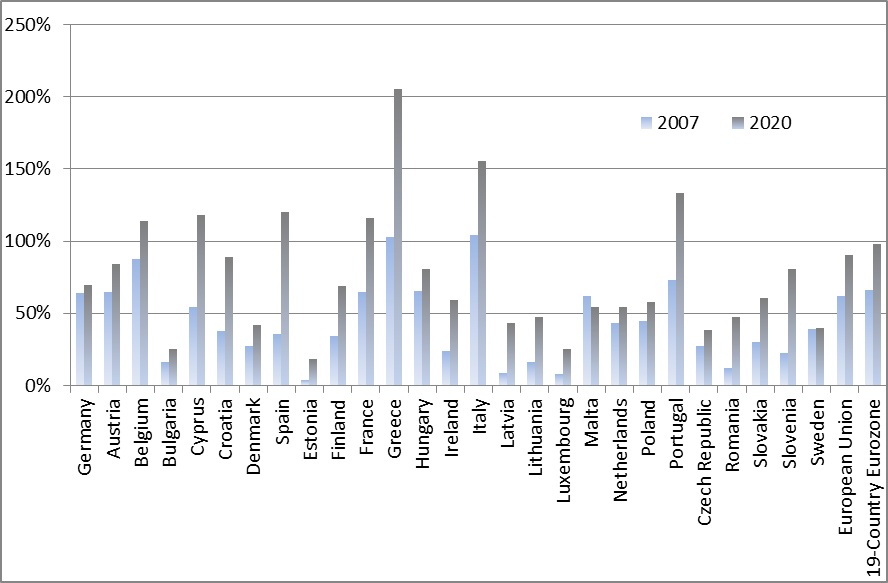II. A COMPASS THAT MIGHT POINT A LITTLE TOO FAR WEST
The United States' renewed investment in the transatlantic relationship makes the CSDP less of a priority for most Member States. Without the motivation to better organise their security and defence, their strategy could rely on NATO more than would be reasonable.
A. THE GREAT RETURN OF ATLANTIC AFFINITIES ...
Joe Biden has heralded a return to the inviolability of the NATO umbrella, singularly reducing the chances of achieving a Strategic Compass that makes significant progress in security and defence. Member States' budget and internal policy perspectives seem no more promising. In short, just when the Strategic Compass is reaching the critical synthesis and political agreement phase, a favourable window for the CSDP is closing .
1. NATO's renewed credibility in the face of a CSDP weakened by Brexit...
' America is back! ' Joe Biden's election, the possibility of seeing the United States act as the world's policeman for law and democracy, alone or within a NATO that reaffirms its purpose of offering Allies unfailing protection, and the nominations of Antony Blinken as Secretary of State and Karen Donfried as Assistant Secretary of State for European and Eurasian Affairs were welcomed enthusiastically throughout the European Union. With a return to a safe and familiar environment, European decision makers have been reassured beyond all measure, most of them hoping for nothing more than to return to old habits.
The United States is determined to hold Russia accountable for its aggressions and interference in the cyber domain while criticising its human rights breaches (while the effects of this turnaround may be hard to see, with withdrawals of troops from the border with Ukraine that are simply anecdotal and the very worrying prison treatment of Alexei Navalny). Similarly, Turkey, which has committed illegal acts against European Allies, can no longer count on the same passivity from the United States, strongly opposed to its purchase of Russian missiles (here, the change is stark: Erdogan has now adopted much more conciliatory rhetoric towards the EU).
In this context, the concept of strategic autonomy, which had seen growing support throughout the four years of the Trump administration, is now eliciting greater mistrust, at least as far as it focuses on security and defence . The Bundeswehr's natural affinity for NATO, in the framework in which it was created, is now expressed within a Germany that is doubly reassured by the freezing of US troop withdrawals--a strong symbol--and the US's refusal to sanction commercial partners of the Nord Stream 2 project. Only its desire to continue a relationship with China that serves its economic interests can still distance it from the United States. Given the knock-on effect German policy has on many European partners, the argument about an unreliable United States, and thus NATO, barely works anymore. In short, the 'conditioned reflexes' of Atlantic alignment are taking over everywhere .
Compared to the pre-Trump situation, Brexit adds an argument for tipping the balance in favour of NATO, since the UK is the ally with the highest defence spending ($60 bn), after the US ($785 bn) and ahead of Germany ($56 bn) and France ($50 bn), 80 ( * ) such that EU countries belonging to NATO now only represent a fifth of the defence spending of all NATO countries. 81 ( * )
2. The budgetary impact of the health crisis
The health crisis has led to very high budgetary spending in order to distribute replacement income and support economic activity, while focusing security attention on the lower end of the spectrum and resilience. In this context, at a time when NATO is reaffirming and even expanding its guarantee (see below), the financial constraints that will replace debt increases could cause Member States to forego operations and capabilities in order to reduce defence budgets . The following graph shows the extent of the damage to the EU's financial situation since 2007, illustrating the two shocks of the 2008 financial crisis and the health crisis.
CHANGE IN PUBLIC DEBT AS A PERCENTAGE OF GDP FROM 2007 TO 2020
Source: Senate Foreign Affairs and Defence Committee, Eurostat figures (retrieved 7 May 2021)
For those Member States that do not adopt budget measures of their own accord, the slightest upturn in inflation--which is now showing signs of picking up--will not fail to force them to do so in order to maintain sustainable levels of debt. The EU itself could end up encouraging or requiring such measures, particularly in return for its 'Next Generation EU' stimulus plan.
It is already expected that Germany's defence budget will not increase after 2022; it could even fall given widely expected budget cuts in the Bundestag, given that only spending justified by NATO can gain approval.
3. Political configurations likely to become less favourable
If we stick to the Franco-German "engine", the German elections in September 2021 and French elections in the spring of 2022 are all uncertainties that weigh on the EU's motivation for defence .
In France, Emmanuel Macron is more sensitive to Europe than his potential competitors in the upcoming presidential elections. In Germany, the elections could result in a 'green-black' coalition between the CDU and Die Grünen, or a three-party coalition that includes the FDP (Liberal Democratic Party), given the recent changes in the Green vote. In the two political equations, the options chosen by the Greens remain the critical variable. Traditionally more reserved on issues of defence than the CDU or the FPD, today they tend to adopt a more open and realistic line that is compatible with the two other parties. 82 ( * ) In contrast, with regard to the strategic approach to the Russian and especially the Chinese regimes, where Germany assumes a fairly clear difference with the United States, it would seem that the Greens have a willingness to be firm, which could bring them closer to the American view.
More generally, there is also the possibility of an upsurge in terrorism or new waves of migration, circumstances that favour populist rhetoric and parties, a tendency towards Euroscepticism and, most certainly, a national withdrawal from security and defence issues, leading to a lack of interest in the CSDP given the NATO guarantee.
*
Thus, in the field of security and defence, all the political and budgetary factors are converging to push the Europeans to embrace the Euro-Atlantic bond and postpone a revitalised European project indefinitely.
* 80 Estimate for 2020, current exchange rate.
* 81 As an illustration, in the embassy responses, Lithuania is described as 'careful not to weaken NATO by allowing an important place for the UK in Europe's defence apparatus'.
* 82 The most radical of them have, for the most part, joined Die Linke, which now occupies the pacifist niche in the political spectrum with an anti-operation and anti-Bundeswehr stance, but which seems unlikely to join a coalition.








